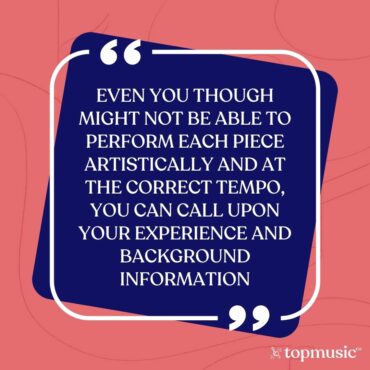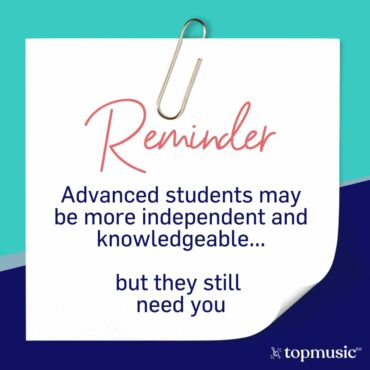So, you have your first student (or students) leaving the intermediate level and embarking on advanced study.
You can do this! (And we’re here to help!)
So, you have your first student (or students) leaving the intermediate level and embarking on advanced study.
Perhaps a bit of imposter syndrome has set in.
Or, at the very least, you are wondering if you’re really up to the task and able to continue to teach this student.
If you are an advanced player, and you’re committed to your own continued learning, then the answer is YES.
You can do this!
And we’re here to help.
Table Of Contents:
When it comes to teaching advanced students, there are several myths within the teaching community. Make sure you don’t get tripped up on them!
Related: Teaching Piano Technique To Advanced Students
In a perfect world, we as teachers would have infinite time to practice the piano ourselves. We would wisely use that time not only for our own enjoyment but to work on everything our students are currently studying.
However, we don’t live in a perfect world, and our time is limited.
Therefore, it’s unreasonable to assume that at the drop of a hat, we’d be ready to perform at a professional level every piece our students are studying.
That said, we do need to be ready to guide our students in their advanced repertoire.
At this morning, can I artistically perform every piece my advanced students are playing at the appropriate performance tempo? No.
Could I artistically perform every piece my students are playing at the appropriate tempo if I were to spend enough time practicing them? Yes.

Even though I can’t perform each piece artistically and at the correct tempo, what I can do is call upon my experience and background information to inform my teaching of any individual piece:
Related: Teaching Expression in Intermediate Historical Repertoire with Janna Williamson
We as teachers should certainly spend some time studying advanced repertoire ourselves, particularly if it is new to us.
Listening to professional recordings, studying excellent editions, practicing difficult sports, and reading background information on the composer are all necessary activities. However, these are all things that can be done on a limited budget of time.
While the Pathetique is a student favorite, there are many, many other sonatas appropriate for early advanced study. A survey of the top grades of exam systems shows this to be the case.
For instance, level 10 of the 2022 RCM syllabus includes 5 sonatas by Beethoven, 9 sonatas by Haydn, and 6 sonatas by Mozart, as well as one by Muzio Clementi.
Any student wishing to play the Pathetique should have already learned multiple other sonatas written in a variety of characters and with a variety of technical challenges. Students embarking on the Pathetique should be well-acquainted with the sonata-allegro form and stylistic concerns of the Classical era.
I know from speaking with many university professors and other judges that examiners and audition panels enjoy hearing pieces other than the most standard offerings. Teachers would do well to broaden their students’ horizons (as well as their own) by teaching many of the other fine early-advanced sonata movements available to pianists.
While it is true the students at this level are far more independent and knowledgeable than when they were just starting lessons or even when they were at the intermediate level, the truth is that they still need a teacher.
If you have studied advanced literature with a teacher yourself, you know how illuminating it can be when he or she draws your attention to details you have missed or offers technical solutions to problems you are experiencing.

Weekly lessons hold students accountable to practice regularly and continue making progress. I know I need accountability, and I’m guessing you do too!
Additionally, students need continued guidance on best practice techniques. I hear from far too many musicians that they did not truly learn to practice until they studied at the undergraduate level. What a gift we give to our intermediate and early advanced students when we empower them to practice efficiently and help them prepare for peak performance.
We all need outside ears to listen and give feedback, regardless of how many years we have played the piano or how much repertoire we’ve performed.
Teaching your first advanced student will be challenging. But it’s a rewarding challenge, and we’re here to help.
Our brand new course, “Advancing Pianists,” is perfect for teachers with students who are nearing the advanced level and are looking for guidance and inspiration.
In this course, I aim to give you all the foundational information you need to set up your student for success.
I’ve provided historical context, performance practice basics, and an overview of which pieces are appropriate for our advancing students, along with specific suggestions for teaching some individual pieces.
“Advancing Pianists” is available to Studio and Evolution members of TopMusicPro.
